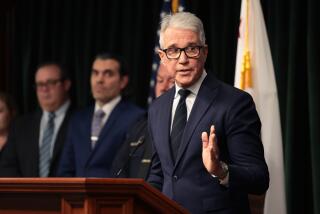Probe Clears Justice Dept. of Defrauding Computer Firm : Inquiry: Special counsel finds ‘no credible evidence’ that the agency conspired to steal Inslaw’s software. The dispute dates to 1982.
WASHINGTON — A special counsel appointed to investigate allegations of Justice Department misconduct in the treatment of a Washington-based computer software firm concluded Thursday that the allegations are groundless.
Nicholas Bua, a former Chicago federal judge who served as special counsel, said in a 267-page report to Atty. Gen. Janet Reno that there is “no credible evidence” to support charges that Justice Department officials or employees engaged in fraud, trickery or deceit to steal the company’s software.
The firm, Inslaw, has waged an 11-year battle through the courts and Congress to try to prove that the Ronald Reagan Administration’s Justice Department illegally expropriated its Promis software program, which is designed to keep track of criminal cases and defendants.
“We also find that DOJ (the department) conducted itself properly after it became involved in litigation with Inslaw,” Bua concluded in a report made public by the department.
Inslaw has been battling the Justice Department almost since it received a $10-million contract for computer services from the agency in 1982. Claiming that the government was illegally denying its rightful payments, the firm filed for bankruptcy in 1985.
During the long, bitter dispute, U.S. Bankruptcy Judge George Bason Jr. found in September, 1987, that Justice officials “took, converted and stole” Inslaw’s software through “trickery, fraud and deceit.” He ordered payment of $6.8 million in damages to the firm.
Two years later, another federal jurist, U.S. District Judge William B. Bryant, upheld Bason’s ruling.
However, in May, 1991, the U.S. Circuit Court of Appeals reversed the findings of both judges on technical grounds. The appellate court said that the two had ruled too broadly in concluding that the Justice Department violated a section of the bankruptcy code that automatically freezes all claims against bankrupt companies.
The Supreme Court later denied Inslaw’s request that it hear the dispute.
The company emerged from bankruptcy in 1988 and took its allegations to Congress. After a Senate subcommittee found no basis for the charges based on months of investigation, the company won a stunning victory last September when the House Judiciary Committee, following its own inquiry, reported that there was “strong evidence” the department “took, converted and stole” Inslaw’s computer program by “trickery, fraud and deceit.”
Then-Atty. Gen. William P. Barr appointed Bua to conduct the inquiry in November, 1991.
Bua, summarizing his findings, reported that “based on all the evidence discussed in this report, we find that there is no credible evidence to support either the allegation that there was a scheme to defraud Inslaw, or the allegation that department employees conspired . . . to steal Inslaw’s software.”
“The allegations in this case seem to know no bounds,” he added. “They literally range from charges of murder and international espionage to claims of simple incompetence.”
Bua reported that “mutual distrust” between Inslaw and the government had helped fuel the long dispute. There was no immediate comment on his report from Inslaw’s owners or attorneys.
Bua’s other findings included:
* There was “no credible evidence” to charges by William Hamilton, Inslaw’s owner, that the Reagan-era Justice Department had conspired against Inslaw with Dr. Earl Brian, a close friend of then Atty. Gen. Edwin Meese III and a former California official while Reagan was governor.
* There was “no credible evidence that department employees sought to improperly influence” Judge Bason’s replacement at the conclusion of his term with another bankruptcy judge.
* There was “no evidence” to support an allegation that department employees “destroyed any documents . . . or otherwise acted improperly to obstruct congressional investigations into Inslaw’s allegations.”
More to Read
Sign up for Essential California
The most important California stories and recommendations in your inbox every morning.
You may occasionally receive promotional content from the Los Angeles Times.










